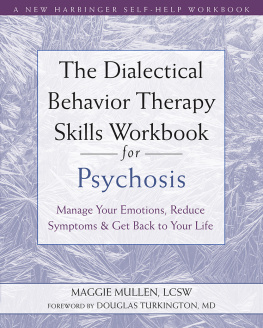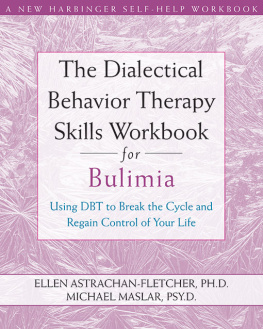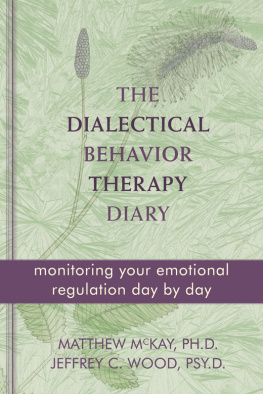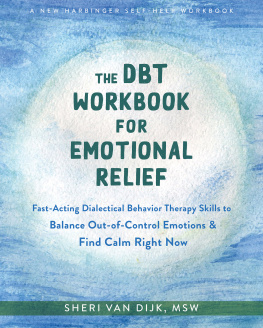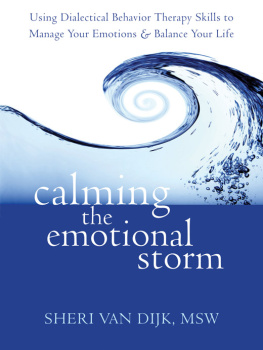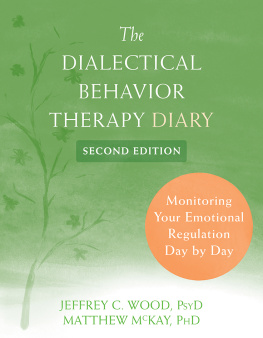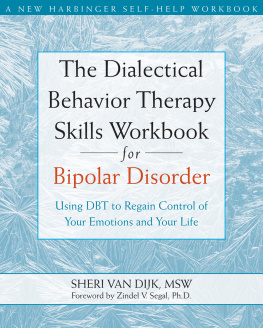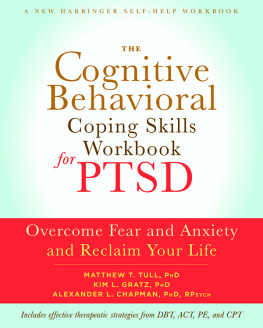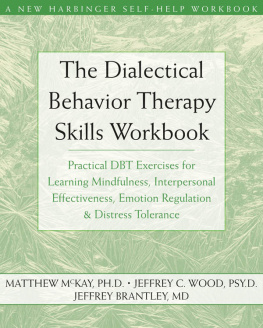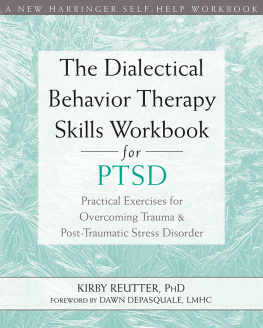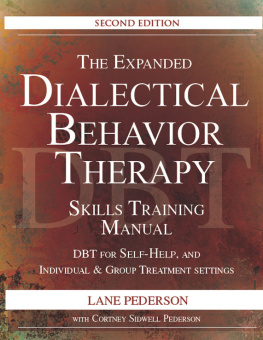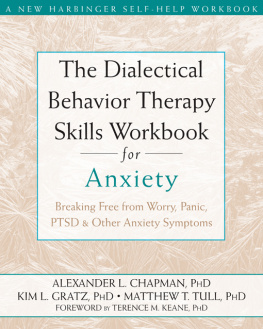Maggie Mullen - The Dialectical Behavior Therapy Skills Workbook for Psychosis
Here you can read online Maggie Mullen - The Dialectical Behavior Therapy Skills Workbook for Psychosis full text of the book (entire story) in english for free. Download pdf and epub, get meaning, cover and reviews about this ebook. year: 2021, genre: Home and family. Description of the work, (preface) as well as reviews are available. Best literature library LitArk.com created for fans of good reading and offers a wide selection of genres:
Romance novel
Science fiction
Adventure
Detective
Science
History
Home and family
Prose
Art
Politics
Computer
Non-fiction
Religion
Business
Children
Humor
Choose a favorite category and find really read worthwhile books. Enjoy immersion in the world of imagination, feel the emotions of the characters or learn something new for yourself, make an fascinating discovery.
- Book:The Dialectical Behavior Therapy Skills Workbook for Psychosis
- Author:
- Genre:
- Year:2021
- Rating:5 / 5
- Favourites:Add to favourites
- Your mark:
- 100
- 1
- 2
- 3
- 4
- 5
The Dialectical Behavior Therapy Skills Workbook for Psychosis: summary, description and annotation
We offer to read an annotation, description, summary or preface (depends on what the author of the book "The Dialectical Behavior Therapy Skills Workbook for Psychosis" wrote himself). If you haven't found the necessary information about the book — write in the comments, we will try to find it.
Maggie Mullen: author's other books
Who wrote The Dialectical Behavior Therapy Skills Workbook for Psychosis? Find out the surname, the name of the author of the book and a list of all author's works by series.
The Dialectical Behavior Therapy Skills Workbook for Psychosis — read online for free the complete book (whole text) full work
Below is the text of the book, divided by pages. System saving the place of the last page read, allows you to conveniently read the book "The Dialectical Behavior Therapy Skills Workbook for Psychosis" online for free, without having to search again every time where you left off. Put a bookmark, and you can go to the page where you finished reading at any time.
Font size:
Interval:
Bookmark:

This excellent workbook makes a valuable contribution to the psychosocial treatment for people with psychosis. Writing in a clear, engaging style, Mullen shows how core dialectical behavior therapy (DBT) skills can be used to reduce symptoms associated with disorders on the psychotic spectrum, build a support network, and improve quality of life. The case examples make the book highly accessible to all. I recommend this workbook for patients, families, and therapists.
Cedar R. Koons, LCSW , DBT consultant, mindfulness teacher, and author of The Mindfulness Solution for Intense Emotions
The experience of psychosis can be traumatizing, often resulting in individuals not only struggling to get back on their feet, but also fearing the next episode and what this might mean for their future. Mullen has done a fantastic job at providing a validating and informative book that will help people not just survive after experiencing psychosis, but learn to thrive once more. This is a much-needed tool for clients experiencing psychosis, as well as for caregivers and therapists working with this population.
Sheri Van Dijk, MSW , psychotherapist; international speaker; and author of several DBT books, including The DBT Skills Workbook for Teen Self-Harm
This user-friendly workbook offers essential skills that help people learn how to manage symptoms of psychosis and build a life worth living. The material is offered with warmth, compassion, and understanding. The years of experience Maggie Mullen has had working with people who experience psychosis, and Mullens fondness for them, permeates the book. I strongly recommend it to people who experience these symptoms and to their loved ones.
Rebecca Woolis, LMFT , author of When Someone You Love Has a Mental Illness , over thirty years experience as program director of community mental health programs for people with psychosis and their families, and therapist in private practice
As a fellow DBT therapist, author, and trainer, I am always on the lookout for simple, practical, and effective ways of making DBT skills usable for the lay reader. In this resource, you will find just that! Maggie Mullen does an amazing job of applying the classic DBT skills of mindfulness, distress tolerance, emotion regulation, and interpersonal effectiveness to the symptoms of psychosis and psychotic disorders. This book is a critical adjunct to psychotropic medications!
Kirby Reutter, PhD , bilingual clinical psychologist with the Department of Homeland Security, and author of The Dialectical Behavior Therapy Skills Workbook for PTSD
This concise, engaging, and well-organized workbook distills key DBT skills that can help with psychosis and related problems (stress, substance use, isolation, among others). Mullen paints a clear and reassuring picture of psychosis, and effectively uses vivid examples, worksheets and exercises to help readers understand their challenges and use DBT skills to manage them. I highly recommend this book for anyone who wants to become empowered with skills to build a life worth living despite psychosis.
Alexander L. Chapman, PhD, RPsych , professor of psychology at Simon Fraser University, president of the DBT Centre of Vancouver, and coauthor of The Borderline Personality Disorder Survival Guide
A brilliant integration of DBT-based skills, cognitive behavioral therapy (CBT), and psychoeducation for clients and loved ones. It is written in a clear, concise, and compassionate voice that focuses on destigmatizing psychotic spectrum illnessand providing both hope and tangible skills. If you or a loved one struggle with psychosis, this is a must-have guide to understanding and ameliorating your symptoms. If you are a therapist, this book provides a thoughtful and effective framework for treating psychosis. This book is a major contribution to our field.
Patrik J. Karlsson, LCSW , behavioral health manager, DBT therapist, and former training director in the department of psychiatry at Kaiser Permanente
When I started working with thought-disordered patients in 1973, we had nothing for them except Thorazine. Finally, there is an evidence-based treatment that doesnt result in tardive dyskinesia, metabolic syndrome, or suppressed awareness. The Dialectical Behavior Therapy Skills Workbook for Psychosis offers a comprehensive, proven-effective program to help affected individuals deal with delusional thoughts and beliefs, surging fear, sadness and anger, and relationship disruption. These therapy processeshelping individuals face their pain and distress while building more effective responsesare the path to emotional and behavioral stability. This is the state of the art for nonmedical treatments of psychosis. It will change many lives.
Matthew McKay, PhD , coauthor of Thoughts and Feelings
This skills workbook is a very useful development to accompany and support CBT for psychosis describing skills drawn from DBT. It includes detailed worksheets guiding the reader through ways of managing distress (including the use of mindfulness), which can remain even when insight into psychotic symptoms has developed.
David Kingdon, MD , emeritus professor of mental health care delivery, and coauthor of Cognitive-Behavioral Therapy of Schizophrenia
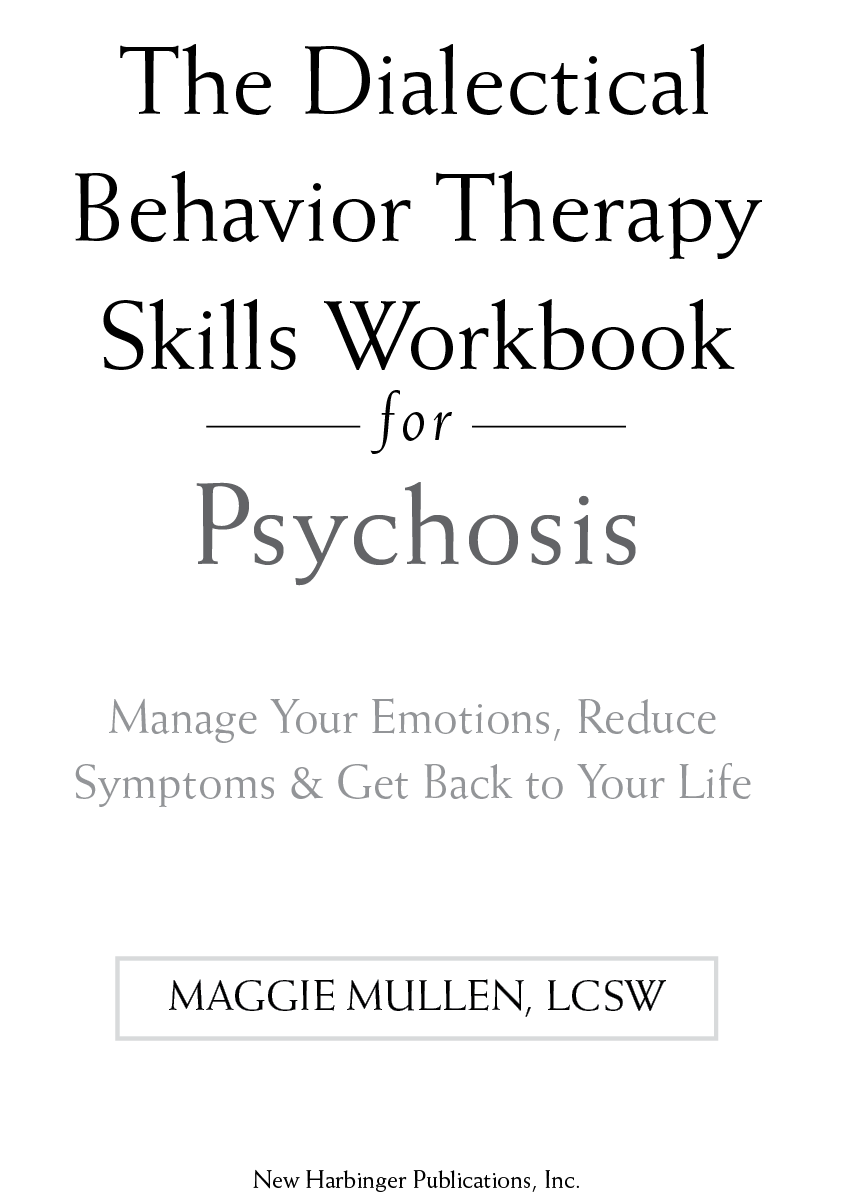
Publishers Note
This publication is designed to provide accurate and authoritative information in regard to the subject matter covered. It is sold with the understanding that the publisher is not engaged in rendering psychological, financial, legal, or other professional services. If expert assistance or counseling is needed, the services of a competent professional should be sought.
Distributed in Canada by Raincoast Books
Copyright 2021 by Maggie Mullen
New Harbinger Publications, Inc.
5674 Shattuck Avenue
Oakland, CA 94609
www.newharbinger.com
In consideration of evolving American English usage standards, and reflecting a commitment to equity for all genders, they/them is used in this book to denote singular persons.
Cover design by Amy Shoup; Acquired by Jennye Garibaldi; Edited by Rona Bernstein
All Rights Reserved
Library of Congress Cataloging-in-Publication Data
Names: Mullen, Maggie, author. | Turkington, Douglas, author.
Title: The dialectical behavior therapy skills workbook for psychosis : manage your emotions, reduce symptoms, and get back to your life / Maggie Mullen, LCSW, Douglas Turkington.
Description: Oakland : New Harbinger Publications, 2021. | Includes bibliographical references.
Identifiers: LCCN 2020034746 (print) | LCCN 2020034747 (ebook) | ISBN 9781684036431 (trade paperback) | ISBN 9781684036592 (pdf) | ISBN 9781684036608 (epub)
Subjects: LCSH: Psychoses--Treatment. | Dialectical behavior therapy.
Classification: LCC RC512 .M85 2021 (print) | LCC RC512 (ebook) | DDC 616.890078--dc23
LC record available at https://lccn.loc.gov/2020034746
LC ebook record available at https://lccn.loc.gov/2020034747
To my clients, for your resilience and courage.
Contents
Foreword
As pessimism and stigma gradually recede, those struggling with symptoms of psychosis are awakening to a new optimism with the hope that recovery is, indeed, possible. This change has occurred due to those with hallucinations, delusions, and negative symptoms finding new ways to take control of these psychotic experiences and, with the help of peer support networks, the negative emotions linked to them. Also, families have increasingly sought to look beyond medication alone to a broader psychosocial management approach, which looks to the individuals strengths and abilities rather than the diagnostic label.
Font size:
Interval:
Bookmark:
Similar books «The Dialectical Behavior Therapy Skills Workbook for Psychosis»
Look at similar books to The Dialectical Behavior Therapy Skills Workbook for Psychosis. We have selected literature similar in name and meaning in the hope of providing readers with more options to find new, interesting, not yet read works.
Discussion, reviews of the book The Dialectical Behavior Therapy Skills Workbook for Psychosis and just readers' own opinions. Leave your comments, write what you think about the work, its meaning or the main characters. Specify what exactly you liked and what you didn't like, and why you think so.

